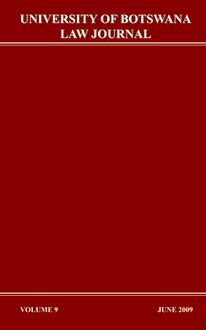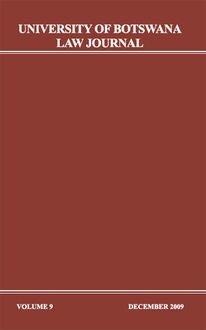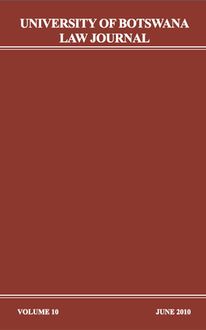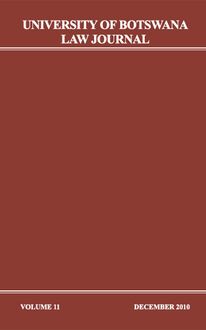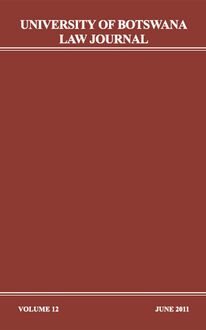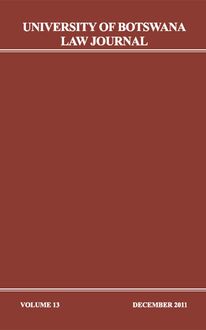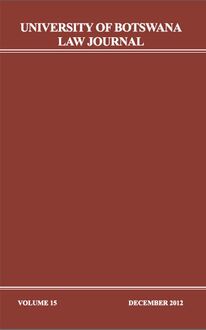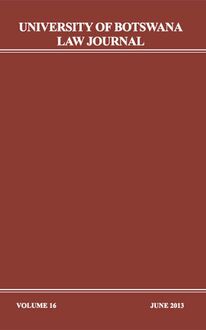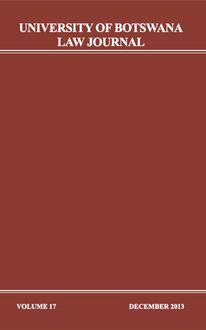-
 Univers
Univers
-
 Ebooks
Ebooks
-
 Livres audio
Livres audio
-
 Presse
Presse
-
 Podcasts
Podcasts
-
 BD
BD
-
 Documents
Documents
-
- Cours
- Révisions
- Ressources pédagogiques
- Sciences de l’éducation
- Manuels scolaires
- Langues
- Travaux de classe
- Annales de BEP
- Etudes supérieures
- Maternelle et primaire
- Fiches de lecture
- Orientation scolaire
- Méthodologie
- Corrigés de devoir
- Annales d’examens et concours
- Annales du bac
- Annales du brevet
- Rapports de stage
La lecture à portée de main
138 pages
English
University of Botswana Law Journal Volume 13, December 2011 , livre ebook
138 pages
English
YouScribe est heureux de vous offrir cette publication

Description
The University of Botswana Law Journal is a peer refereed journal published twice a year. It provides a forum for scholars and practitioners to reflect on diverse legal issues of national, regional and international significance and of local and regional relevance.PatronThe Hon. Justice Nganunu, Chief Justice of BotswanaInternational Editorial Advisory BoardProf. D. D. N. Nsereko, Judge, International Criminal Court, The Hague, The NetherlandsProf. W. Du Plessis Faculty of Law, North-West University (Potchefstroom Campus), South Africa Prof. T. Maluwa H. Laddie and Linda P. Montague Professor of Law, Dickinson School of Law, Penn. State University, USA Prof. M. Reisman Myres McDougal Professor of Law, Yale Law School, New Haven, USA Prof. K. Frimpong Ghana Institute of Management and Public Administration, (GIMPA), Accra, Ghana Prof. S. Roberts Department of Law, London School of Economics, United Kingdom Prof. A. McCall Smith Edinburgh Law School, University of Edinburgh, United Kingdom Prof. C. Forsyth Faculty of Law, Robinson College, University of Cambridge, United Kingdom Prof. B. Othlogile Vice Chancellor, University of Botswana Dr. A. Molokomme Attorney-General, BotswanaEditorial BoardProf. Peter Takirambudde Editor-in-Chief, University of BotswanaMrs. E. Macharia-Mokobi Secretary, University of BotswanaDr. K. Solo University of BotswanaProf. C. Ngongola University of BotswanaProf. J. Kiggundu University of BotswanaProf. E. K. Quansah University of BotswanaDr. O. B. Tshosa University of BotswanaMr. T. Sebego Vice chairman, Law Society of Botswana
Sujets
Informations
| Publié par | PULP (Pretoria University Law Press) |
| Nombre de lectures | 1 |
| Langue | English |
Extrait
UNIVERSITY OF BOTSWANA LAW JOURNAL
VOLUME 13 DECEMBER 2011
ARTICLES
The Effectiveness of International and Regional Measures in ...................3 in Recovering Assets Stolen from Poor Countries S. Kingah
A Commentary on the New Botswana’s Competition Act.......................27 Z. Kebonang
The Unfair Prejudice Remedy - A Relief for the Minority.......................37 Shareholders A.O. Nwafor
Combating Cybercrime in Botswana ........................................................55 A. Molokomme
The Clash between Religious Freedom and Medical Science: ................61 The Case ofAttorney-General v Kealotswe O. Jonas
The WTO TRIPS Agreement and Access to Medicines in ......................87 Southern Africa J. Pfumorodze
Rethinking Article 1(4) Additional Protocol I: Scope of........................103 Liberation Movements as International Armed Conflicts, and Complexities in Determining War Crimes P. Talekar
COMMENTS
The Botswana Red Cross: A proposed return to the International .........115 Humanitarian Law Mandate E.N. Macharia-Mokobi
South Africa
RECENT LEGAL DEVELOPMENTS
-
S. Heleba and B. Kgori................123
ARTICLES
3
The effectiveness of international and regional measures in recovering assets stolen from poor countries
ABSTRACT
Stephen Kingah*
The author posits that while numerous international initiatives on the eradication of poverty including the battle for freer trade, debt relief and more development money are being pursued to help promote better economic and social conditions the recent, the successful implementation of such measures will remain elusive if the issue of corruption through capital flight is not effectively addressed. The author seeks to demonstrate that enactment of legal regimes per se designed to counter corruption through capital flight argues though necessary would not suffice absent leadership and consequential enforcement measures w at national, regional and international levels.
1.
INTRODUCTION
Corruption is one of the biggest challenges for developing countries that hope 1 for better economic and social conditions. Since the 1990s efforts have been made both at the regional and global levels to address the conundrum of corruption. In 2005 the United Nations Convention against Corruption (UNCAC) came into force. The attainment of this milestone marked the political acme in international efforts to combat the ills of corruption defined as the illicit swindling of public funds for private ends. One of the important features of the UNCAC is the incorporation of provisions that deal with the recovery of stolen assets. The section on asset recovery in the Convention provides the possibility for states to create mechanisms for mutual legal 2 assistance in issues of recovery of stolen assets. In many developing countries public officials steal national funds and save the same in foreign banks while citizens wallow in harrowing despondency. There are litanies of worthwhile international initiatives on the
*
1
2
Stephen Kingah has a PhD in Law from the Free University of Brussels (VUB) andis Fellow at UN’s University CRIS Bruges, Belgium. T.R. Snider and W. Kidane, “Combating Corruption Through International Law in Africa: A Comparative Analysis,” 40Cornell International Law Journal(2007), p. 691. T. Daniel, “UN Convention against Corruption,”inThe Global Corruption Report, R. Hodess, T. Inowlocki, D. Rodriguez and T. Wolfe eds., London, Pluto Press (2004), p. 106.
4 UNIVERSITY OF BOTSWANA LAW JOURNAL DECEMBER 2011
eradication of poverty including the battle for freer trade, debt relief and more development money. These will come to naught if the issue of corruption through capital flight is not addressed properly. Any proper solution to the issue of capital flight is meaningless if clear and sustainable strategies and policies are not identified and applied to recover the stolen money. Increased globalization has been accompanied by a hike in the trans-3 nationalization of crime. Corruption has become more complex and more 4 elusive. It is estimated by the US’ National Intelligence Council that the shadow system of illicit financial flows will continue and may even make 5 inroads into core sectors of the economy by 2025. Corruption and the illicit 6 flow of dirty money cost the world about a trillion dollars every year. The World Bank and the UN Office on Drugs and Crimes (UNODC) have revealed that corruption associated with bribes of public officials in developing and transition countries is about 20 to 40 billion dollars per annum and this figure is about 20 to 40 percent of overseas development assistance 7 (ODA). It is estimated that Africa alone loses about 148 billion dollars 8 9 annually to corruption. African countries such as South Africa, Nigeria and Kenya that are regarded as hubs in their respective regions and that ought to have been at the forefront as leading examples of probity have been caught in 10 a vortex of graft. Corruption is particularly debilitating for citizens of developing nations because it stalls efforts geared at innovative and 11 sustainable wealth creation and management. It has been argued that the fight against corruption and efforts to eradicate poverty in poor countries are 12 complementary. As Robinson postulates, corruption is particularly bad for poor countries because it dilutes economic growth, discourages foreign investment and reduces the resources available for infrastructure, public services and anti-poverty initiatives. He further argues that corruption diminishes the effectiveness of aid-funded development projects and dampens
3
4 5
6
7 8
9 10 11
12
T.V. Beken, “The Best Place for Prosecution of International Corruption Cases: Avoiding and Solving Conflicts of Jurisdiction,”The Third Global Forum on Fighting Corruption and Safeguarding Integrity, Seoul (29 May, 2003), p. 2. F. Valérian, “Global Corruption: Where do we Stand?”Cayman Financial Review(5 January, 2010). National Intelligence Council,Global Trends 2025: A Transformed World, Washington DC, NIC (November 2008), p. 88. UNODC and the World Bank,Stolen Assets Recovery Initiative: Challenges, Opportunities and Action Plan, World Bank, Washington DC (June 2007), p. 1. Ibid. J. Smith, M. Pieth and G. Jorge, “The Recovery of Stolen Assets: A Fundamental Principle of the UN Convention Against Corruption,” 2CMI U4 Brief(February 2007), p. 1. BBC, “Zuma Minister Pressed on Mercedes,”BBC News(19 May, 2009). C. Dugger, “Grand Larceny in Africa,”The New York Times(16 June, 2009). R. Calderisi,The Trouble with Africa: Why Foreign aid isn’t Working, New Haven, Yale University Press (2007), pp. 88-89. I. Jimu, “Managing Proceeds of Asset Recovery: the Case of Nigeria, the Philippines, Peru and Kazakhstan,” 6ICAR Working Paper Series(2008),p. 15.
RECOVERING ASSETS STOLEN FROM POOR COUNTRIES 5
13 public support for development assistance in rich countries. But the debilitating fallouts from corruption are not only economic. The culture of corruption also has significant political or governance related repercussions. Corruption poses a great threat to the rule of law, human rights, 14 democracy and the economic prospects of developing countries. Corruption is used in areas such as South Asia and Africa as a means of distributing state 15 patronage and ensuring regime continuity. Elite in many poor countries tend to extort commissions on foreign loan contracts and deposit the funds in 16 foreign accounts. Corruption is not a problem solely for least developed and developing countries. In emerging markets the issue is also posing stupendous challenges as revealed in Brazil, Russia, China and India. In Brazil, there are risks that corruption could derail its path for economic greatness and even the Workers’ Party of President Ignacio Lula da Silva has been embroiled in 17 doggy practices including its avid support for Senate president José Sarney 18 who has been embroiled in ethical probes. In Russia it is estimated that 300 19 billion dollars was lost to corruption in 2008. In China, it is believed, 3 percent of GDP is being lost annually to a tiny group of elite and about 10 percent of government spending, contracts and transactions is used as 20 kickbacks and bribes or is simply stolen. In India there are fears that corruption could undermine the very foundation of democracy and 21 statehood. But what efforts are made to ensure that proceeds gained from corruption are recovered and that such asset recovery serves as disincentive 22 for potential offenders?
2.
EXAMPLES OF ASSET RECOVERY
There have been some efforts to recover funds stolen by leaders of developing countries and saved or invested in foreign banks and financial houses.
13
14
15 16
17 18
19 20
21
22
M. Robinson, “Corruption and Development: An Introduction,” inCorruption and Development, M. Robinson ed., London, Frank Cass (1998), p. 2. M. Pieth, “International Efforts to Combat Corruption, 9th International Anti-Corruption Conference (IACC),”Durban (10-15 October, 1999), p. 2. Robinson, supra note 14. A. Gaisie and G. Anselm, “Curbing Financial Crime Among Third World Elites,”8Journal of Money Laundering Control(2005),p. 371. L. Lopez, “Corruption Hampers Brazil’s Bid for World Clout,”Forbes(18 August, 2009). A. Barrionuevo, “Scandal Puts Pressure on a Brazilian Leader to Step Down,”The New York Times(6 August, 2009). R. Edson, “Obama Urges Russians to Cut out Corruption,”Fox Business(7 July, 2009). M. Pei, “Corruption Threatens China’s Future,” 55Carnegie Endowment for International Peace Policy Brief(October 2007), at pp. 2 and 5. See also M. Pei, “The Dark Side of China’s Rise,”Foreign Policy (March/April 2006) and M. Pei, “China is Stagnating in its ‘Trapped Transition,’”Financial Times (24 February, 2006). R. Kumar, “Corruption and Human Rights: The Human Right to Corruption-Free Services – Some Constitutional and International Perspectives,” 19/19Frontline(14-27 September, 2002). Efforts to recover assets stolen through corrupt practices may also inform the manner in which authorities deploy resources in limiting illicit outflows through other debilitating practices such as money laundering, tax evasion and international trade mispricing.
6 UNIVERSITY OF BOTSWANA LAW JOURNAL DECEMBER 2011
Examples include Nigeria, The Philippines, Peru, Pakistan, Kenya, Haiti, Cameroon, Indonesia and Iraq. While there have been success stories in some of the recovery efforts the trend has been more pessimistic. The cases below are selected because they are representative of the regional experiences in the area of asset recovery.
a.
The Recovery Efforts
Nigeria for one is a country that is awash with a rich sub soil. It has the highest reserves of oil and gas in Sub-Saharan Africa and also has a strong man power of about 150 million inhabitants. In Nigeria alone, 420 billion dollars have been 23 stolen from state coffers since independence. Nigeria is also a country where 24 ethnic solidarity is used to justify corruption. Although blessed in its sub-soil, the country has been blighted by a handful of military dictators who monopolized the levers of power from the 1960s until the 1990s. The main military dictator whose reign was particularly preposterous, egregious, avaricious and callous was that of General Sani Abacha under whose tyranny Ogoni activists including Ken Saro Wiwa were executed for political activism. Abacha was not only ruthless to his opponents like Chief Abiola and Olusegun Obasanjo but he was also the chief executive officer of a cabal of rapacious individuals who brazenly stole approximately five billion dollars from the state coffers. This singular demonstration of egoism in a country where more than half of the population wallows below the poverty line and where economic activities are as epileptic as power supply, left many observers bewildered. Yet what Abacha was doing in Nigeria should be placed in a context. In the 1990s Africa was basking in the shadows of many tyrants who had embezzled state funds without any qualms. Such was the case of Mobutu of ex Zaire, Bokassa of the Central African Republic, Hissene Habré of Chad and a battery of impious rulers who ruled their countries with tight fists. In the 1990s the critical advocacy of international non-governmental organizations such as Transparency International was still inchoate and not as vigorous as it has now expanded. Yet toward the late end of that decade there were increased calls for reform from NGOs and donor countries who wanted more accountability in the use of their tax payers’ dollars in the form of aid. 25 In 1998 Abacha died in controversial circumstances. He was succeeded by General Abdulsalami Abubakar who promised to return the
23
24 25
A. Bacarese, “Advancing International Understanding and Cooperation in Combating Fraud and Corruption: Recovering Stolen Assets – A New Issue?” 10Academy of European Law Forum(2009),p. 422. R. Guest,The Shackled Continent: Africa’s Past, Present and Future, London, Pan Books (2005), p. 120. R. Baker,Capitalism’s Achilles Heel: Dirty Money and How to Renew the Free Market System, New Jersey, John Wiley and Sons Inc (2005), pp. 61-62.
RECOVERING ASSETS STOLEN FROM POOR COUNTRIES 7
country to multi party democracy, stem graft and recover some of the funds that had been siphoned during the reign of his predecessor. Following the multi party elections that were held in 1999 the former military ruler and Abacha prisoner Olusegun Obasanjo was elected president. He came in with a promise to also root out corruption and recover funds that had been stolen under the presidency of Abacha. Within Nigeria Obasanjo made an effort to stem corruption as state governors and even top ranking officials within the security services were arrested following allegations of grave larceny. Obasanjo also created the Economic and Financial Crimes Commission that was led by the renown Nuhu Ribadu. Moreover he convinced the then World Bank Vice President Ngozi Okonjo Iweala to return and serve as finance minister. As soon as she assumed office Dr Iweala led Nigeria’s entry into the Extractive Industries Transparency Initiative; negotiated the cancellation of Nigeria’s public external debt and above all started a process of publishing the figures of oil proceeds and the local allocations of the same to local communities. The Obasanjo Administration also took the anti corruption crusade to a retroactive level by making efforts to recover the funds that had been stolen from the country by Abacha and his cohort. Apart from his Nigerian accounts, Abacha held various accounts around the world especially in the United Kingdom, Cayman Island, Liechtenstein, Jersey, Bahamas, Luxemburg, the US and Switzerland. The banks in Switzerland that aided, abetted and provided shelter for Abacha’s stolen money included UBS AG, Zurich; UBS AG, Geneva; Union Bancaire Privée, Geneva; Crédit Suisse, Zurich ; Bank Len, Zurich; Banque Barring Brothers, Geneva; Goldman Sachs and Company, Zurich; Gothard Bank, Geneva; Citibank Zurich; Banque Nationale 26 De Paris, Basle; FIBI Bank (Schweiz) A. G. Zurich. The battle to recover the stolen funds in Switzerland became a tense forensic tussle between the Nigerian Government and the Abacha family. In 1999, the Nigerian Government hired the Swiss based law firm (Monfrini and Partners). The Swiss authorities ordered a freezing of the accounts of Abacha in December 1999 following requests by Nigeria for mutual legal cooperation. However, further actions were contingent on a successful criminal conviction of Abacha in Nigerian courts. This proved difficult mindful of the patronage system that the former dictator had put in place. This system also affected the judiciary and so a Nigerian conviction proved a Herculean task mindful that fighting corruption and dealing with recovery issues are very difficult in African 27 countries where graft includes an element of organization and conspiracy. But in 2004 Monfrini succeeded to demonstrate before Swiss authorities that
26
27
L. Aikins, “Switzerland: A Parasite Feeding on Poor African and Third World Countries?”Modern Ghana.com(17 June, 2009). S. Riley, “The Political Economy of Anti-Corruption Strategies in Africa,” inCorruption and Development, M. Robinson ed., London, Frank Cass (1998), p. 139.
8 UNIVERSITY OF BOTSWANA LAW JOURNAL DECEMBER 2011
proof and corroboration of criminal origin was sufficient for further actions in Switzerland. Full repatriation of 505.5 million dollars took place at the beginning of 2006. The deal was partly reached because the Abacha family was left with 28 a proportion of the proceeds (100 million dollars). The Swiss government in turn only agreed to release the funds on the condition that the money would be used for the provision of social services. It paid the World Bank’s for its services to ensure that the money was used for the attainment of millennium 29 development goals. In a welcome development in 2009 a Swiss Judge Yves Aeschliman has ordered that 350 million dollars worth of assets held by the son of Sani Abacha (Mohammad Ababcha) in Luxemburg and the Bahamas 30 be frozen. It is a judicial first in Swiss judicial history. Spasmodic efforts to recovery stolen assets have continued in Nigeria. In 2009 vice president Goodluck Jonathan pressed the visiting Swiss foreign minister Calmy-Ray to accord Nigeria better assistance and cooperation in recovering more funds that have been stolen from Nigeria and 31 stashed in Swiss accounts. In a related development, the Serious Organized Crime Agency in the UK decided that 43 million pounds of stolen assets held 32 in the UK will be sent to Nigeria. In the Philippines, Ferdinand Marcos wreaked the country for over 20 years at the helm of the state. Marcos ruled as megalomaniac and autocrat from 1965 until 1986 stealing an estimated sum of 5 to 10 billion dollars. He spent this on a lavish lifestyle that was epitomised by a highly extravagant wife, Imelda Marcos. This was all done in a country where the majority of the population live in poverty. He stole money directly from public coffers and like Abacha ordered the Central Bank on many occasions to transfer the proceeds directly to foreign slush accounts. Marcos also stole international aid accorded to the Philippines and dabbled in extortion as well as kickbacks gained in procurement deals. The proceeds of the Marcos regime were stored in many major global financial hubs especially in Switzerland. Recovery efforts started in 1986 after Marcos was chased out of power. To pilot the efforts the government of Corazon Aquino created the Presidential Commission on Good Government (PCGG). In the same year demands were also made for Marcos’ accounts to be frozen in Switzerland. The back and forth that ensued between the Swiss authorities and the PCGG went on for about a decade. Initially the PCGG’s request for a mutual legal
28 29
30 31
32
D. Scher, “Asset Recovery: Repatriating Africa’s Looted Billions,” 14/4African Security Review(2005). UNODC and the World Bank,Stolen Assets Recovery Initiative: Challenges, Opportunities and Action Plan, Washington DC, World Bank (June 2007), p. 18-19. F. Williams, “Swiss Judge sets Precedent in Global Graft Fight,”Financial Times(23 November, 2009). Juliana Taiwo, “Nigeria: Government Seeks Swiss Assistance to Recover More Looted Funds,”This Day Newspaper(17 April, 2009). Y. Akinsuyi, “UK to Repatriate 43 Pounds Stolen Money to Nigeria,”This Day – African Views on Global News(2010).
RECOVERING ASSETS STOLEN FROM POOR COUNTRIES 9
agreement was rejected by the Swiss authorities for being too generic. In 1990 Switzerland demanded the presentation of a forfeiture order by a local court in the Philippines within a year else the freezing order could be quashed. Between 1995 and 1997 the PCGG finally produced an order for forfeiture that was acceptable to the Swiss authorities and in 1998 parts of Marcos’ assets were transferred to an escrow account in the Philippines National Bank. In 2003 the PCGG forwarded the sum of 624 million dollars to the Treasury. The experiences of Peru were slightly different from those of the Philippines and Nigeria because the turning point in the entire saga was an episode in which the head of the intelligence services was caught on camera giving bribe to a law maker. The intelligence chief, Vladimiro Montesinos has been the chief architect of very venal political practices led by President Alberto Fujimori. Fujimori ruled Peru from 1990 until 2000 when he resigned. During his reign over 2 billion dollars were stolen mainly through fraudulent tenders for defence procurement and the use of shell companies in numerous tax havens. The Peruvian ruling establishment was aware of what was going on but silence was opted for mainly because Montesinos used illicit funds to bribe judicial, legislative and media officials. Following the departure of Fujimori and his cabal, requests were made by the Peruvian authorities for funds linked to Montesinos to be frozen in the US, Switzerland and the Cayman Island. The estimated sum frozen was 185 million. The proceeds were used to create a special fund known as the Fedadoi fund. However, the fund was not optimally managed as the institutions represented by Fadadoi members used the funds mainly for the budgets of the line ministries and 33 institutions that they represented within the fund. Instances of graft in Pakistan that have been linked to talk of international recovery efforts mainly pertain to the funds alleged to have been misappropriated by the former Prime Minister Benazir Bhutto and her 34 husband, current Pakistani President Asif Zardari. Mrs Bhuttu and her husband gained commissions from public contracts that were published and executed in a manner bereft of transparency. In 1997, the Attorney General in Pakistan contacted colleagues in the UK, Switzerland, and US. Prosecutors in Switzerland led at the time by Carla del Ponte provided full cooperation and the result was that checks were conducted on over 500 accounts linked to the 35 Bhutto family. This led to the freezing of about 80 million dollars. Nevertheless, the temporal gap between the freezing order and the actual repatriation turned to be significant. As a result of the corruption of the Bhutto family, it has been alleged that Pakistan lost about 2 billion in tariff
33 34
35
UNODC and World Bank, supra note 30, p. 20. J. Carver, “The Hunt for Looted State Assets: The Case of Benazir Bhutto,” inThe Global Corruption Report, R. Hodess, T. Inowlocki, D. Rodriguez and T. Wolfe eds., London, Pluto Press (2004), p. 102. Carver, supra note 35, p. 104.
10 UNIVERSITY OF BOTSWANA LAW JOURNAL DECEMBER 2011
36 revenues. Some reports indicate that the President Zardari also known as the famous Mr 10 percent misappropriated 1.5 US dollars from Pakistan during the 37 time he served as minister in his wife’s cabinet and prior to that. In 2009, the Chief Justice of the Pakistani Supreme Court Iftikhar Mohammad Choudhry adumbrated the ruling that benefits made under an amnesty deal between the Bhuttu family, the US and Pakistani governments, alongside cases withdrawn and acquittals made related to the Bhuttus were null and void. The amnesty was negotiated by the US government and Musharraf and it allowed Benazir Bhutto to return to Pakistan to active politics. Recovery efforts in Pakistan go beyond targeting the resources of the Bhuttus. Efforts have been made in the past by the National Accountability Board (NAB) to trace and recover funds stolen through corrupt practices and abusive tariff actions or trade mispricing. The NAB has hired the services of Broadsheet to assist with the tracing and recovery of stolen assets. Under the former President Daniel Arap Moi about 2 billion dollars was stolen and stashed in foreign accounts. To trace the stolen funds from Kenya, President Mwai Kibaki sought the services of Kroll Associates. In 2003 Kroll revealed some of the trails of the funds to which Moi and his children had subjected the wealth of Kenyans. Some of the funds were 38 handled by Crédit Suisse Zurich and Citibank in Geneva. Even though the Kenyan Government paid Kroll a stupendous sum, the country did not succeed to recover the stolen funds. The inability of the government to address the issue of corruption and recovery is epitomized by the Goldenberg Scandal that was orchestrated by Kamlesh Pattni. Pattni and a close relative had developed a reputation of creating shell and quasi non-existent companies (in this case Goldenberg International) that billed the government millions of dollars without delivering 39 due services (gold exports). The scandal was so deep and widespread that it also affected the judiciary as many within the government circles benefited from the scheme that had been set up by Pattni. Gideon Moi and Philip Moi both sons of the former president Arap Moi were implicated. So were former vice president George Saitoti and over 20 judges who resigned. Under Kibabaki efforts to go after those implicated in the Goldenberg scandal have stalled. Kenya is a country regarded as the lungs of economic activities in Eastern Africa. However graft and venality are major issues. For Kenya’s former anti corruption czar John Githongo, corruption is all that holds the
36 37
38
39
Carver, supra note 35, p. 103. M. Tran, “President Zardari Under Pressure as Pakistani Judges Rule Amnesty is Void,”Guardian.co.uk (2009). L. Aikins, “Switzerland: A Parasite Feeding on Poor African and Third World Countries?”Modern Ghana.com(17 June, 2009). D. Scher, supra note 29.
RECOVERING ASSETS STOLEN FROM POOR COUNTRIES 11
government together. He has said the glue of the so-called Rainbows coalition 40 is greed. Efforts to recover the money stolen from Haitians by the Duvalier family have been ongoing for many years. Haiti is one of the poorest countries in the Western Hemisphere and it has also been very vulnerable to natural shocks such as the recent earthquake that killed over 200,000 people. As a cash strapped nation with people in need of basic services, access to any form of financial resources is vital for Haiti. That is why the efforts to recover money held by Swiss banks on behalf of Jean Claude Duvalier are very critical for the future prosperity of Haiti. The pillage to which Haiti has been subjected can be described by the anecdote of an IMF loan granted to the country in 1980. After the IMF granted the country the sum of 22 million dollars in loans, Duvalier personally misappropriated 16 million of these. One of the badges of his profligacy was a yacht which he bought for 1 million dollars and also rented a Riviera villa in France at 40,000 dollars per month. In total, Jean Claude Duvalier and former wife Michelle Duvalier as well as two others are alleged to have stolen the sum of 504 million dollars from Haitian public treasury between 1971 and 1986. There is a symbolic battle that is ongoing to return 6.5 million dollars of those assets saved on Swiss accounts back to the Haitian people. Tracing the money has been difficult mindful that the Duvaliers have been adept at laundering. Efforts to recover the funds started in 1986. The 6.5 million were traced to a Liechtenstein based Brouilly Foundation created Duvalier’s mother through a Panamanian company. Investigations were forfeited in 2002 as Swiss authorities declared Haiti a failing state and froze the accounts because there was no viable government whose cooperation was needed in the sense of providing ongoing criminal investigation against Duvalier. This barrier was side stepped once a new government was in place in 2008. The Duvalier family still tried to stall the process in February 2009 even as Haiti’s lawyers 41 expressed optimism. However in a recent twist a Swiss court ordered that the Duvalier funds be returned to the family. The court ruled that the statute of limitations for the organised crime charges against Duvalier had run its course in 2001, 15 years after Jean Claude Duvalier was chased from power in 1986. However the Swiss government has maintained that the assets be frozen 42 pending a legislative amendment. Cameroon is a Country that led the Transparency International charts of the most corrupt country in 1998 and 1999. Although efforts have been made to curb corrupt practices, graft and larceny remain widespread. Some of
40 41 42
D. Howden, “Kenya’s Decline and Fall,”The Independent(1 July, 2009). S. Schubert, “Haiti: The Long Road to Recovery,”Frontline World PBS(22 May, 2009). ICAR, “Duvalier Asset Cannot (yet) be returned to Haiti – Swiss Federal Court Decision,”Basel Institute of Governance(3 February, 2010).
-
 Univers
Univers
-
 Ebooks
Ebooks
-
 Livres audio
Livres audio
-
 Presse
Presse
-
 Podcasts
Podcasts
-
 BD
BD
-
 Documents
Documents
-
Jeunesse
-
Littérature
-
Ressources professionnelles
-
Santé et bien-être
-
Savoirs
-
Education
-
Loisirs et hobbies
-
Art, musique et cinéma
-
Actualité et débat de société
-
Jeunesse
-
Littérature
-
Ressources professionnelles
-
Santé et bien-être
-
Savoirs
-
Education
-
Loisirs et hobbies
-
Art, musique et cinéma
-
Actualité et débat de société
-
Actualités
-
Lifestyle
-
Presse jeunesse
-
Presse professionnelle
-
Pratique
-
Presse sportive
-
Presse internationale
-
Culture & Médias
-
Action et Aventures
-
Science-fiction et Fantasy
-
Société
-
Jeunesse
-
Littérature
-
Ressources professionnelles
-
Santé et bien-être
-
Savoirs
-
Education
-
Loisirs et hobbies
-
Art, musique et cinéma
-
Actualité et débat de société
- Cours
- Révisions
- Ressources pédagogiques
- Sciences de l’éducation
- Manuels scolaires
- Langues
- Travaux de classe
- Annales de BEP
- Etudes supérieures
- Maternelle et primaire
- Fiches de lecture
- Orientation scolaire
- Méthodologie
- Corrigés de devoir
- Annales d’examens et concours
- Annales du bac
- Annales du brevet
- Rapports de stage
Signaler un problème
YouScribe
Le catalogue
Le service
© 2010-2024 YouScribe
